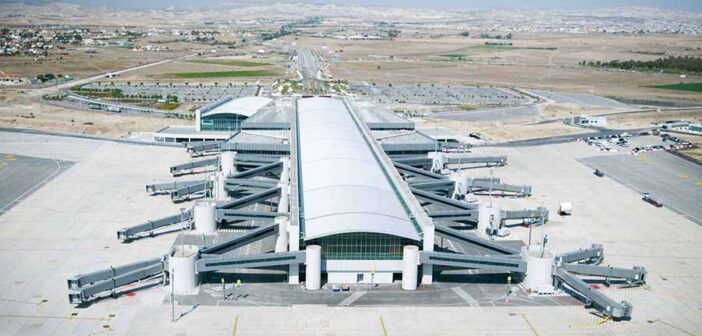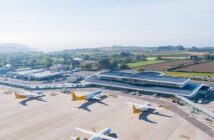Larnaca International Airport (LCA), located 4 kilometres southwest of Larnaca’s city centre, serves as Cyprus’s primary gateway, handling around 8 million passengers annually. The single terminal, opened in 2009, offers a modern and straightforward layout with departures on the upper level and arrivals on the ground floor, connected by clear English and Greek signage.
With 48 check-in desks and nine gates, navigation is simple, though the absence of air bridges means passengers board via mobile stairs. For those with mobility needs, the airport provides wheelchair assistance, accessible parking, priority seating, and spacious restrooms, with support available if requested 48 hours in advance through airlines or the information desk.
Access to the airport is convenient, with multiple transport options linking to Larnaca, Limassol, Nicosia, and resorts like Ayia Napa. Public buses, including lines 425, 429, and 456, connect to Larnaca Station in about 15 minutes for €1.50 (£1.30), with tickets available onboard or via the Motion Bus Card. The Limassol Airport Express and other shuttles serve destinations like Nicosia and Protaras, with fares around €9 (£7.50).
Taxis, available 24/7 outside arrivals, cost approximately €15 (£13) to central Larnaca, while car rental agencies like Avis, Hertz, and Sixt operate from the arrivals hall. The airport is easily reachable via the B4 road, with 1,200 parking spaces and a free five-minute drop-off zone for disabled travellers.
The passenger experience is designed for efficiency, though peak summer months can strain capacity. Check-in opens three hours before international flights and two hours before domestic, closing 40 minutes prior, with self-service kiosks and e-gates speeding up the process for airlines like Aegean.
Security screening averages 15 to 20 minutes but can extend to an hour during busy periods, particularly for non-Schengen flights requiring passport control. Travellers should arrive three hours early to account for potential queues. Free Wi-Fi is accessible via the “Airport Free-Wifi” network, and charging stations are available near gates and eateries. The Aspire Aphrodite Lounge, open 24 hours on the third floor, offers snacks, showers, and a terrace for around £30, accessible via Priority Pass. Additional amenities include baby-changing rooms, a children’s play area, and baggage storage at the Special Baggage Counter for €20 per day.
Dining and retail options cater to a range of tastes, with over 10 eateries and shops. The Atrium Restaurant, Finns Seafood Bar, and chains like Burger King and Costa Coffee serve local and international dishes, with a coffee priced at €3 and meals up to €15. Duty-free shops offer cosmetics, wines, and Cypriot products like olive oil and halloumi, while boutiques like Jo Malone and Gucci provide luxury items, open from 5 am. until the last flight, with some eateries operating 24 hours from July to October. A currency exchange and ATMs are available in both arrivals and departures areas.
On-time performance is generally reliable, with most flights departing within 15 minutes of schedule, supported by a 3,000-metre runway and modern navigation systems. However, summer congestion and occasional staffing shortages at immigration can cause delays. Passengers should monitor flight statuses via the airport’s app or screens. For connections, the single terminal simplifies transfers, with minimum connection times of 40 minutes for domestic and 60 minutes for international flights, often through Athens or London. Fast-track lanes, available for €5, reduce wait times at security and immigration.Potential delays often stem from high passenger volumes in summer, leading to crowded check-in and security areas, with passport control for non-Schengen flights sometimes taking up to an hour. Baggage handling issues have been reported, particularly during peak periods, and staffing shortages can slow immigration. Road traffic on the B4 during rush hours may also delay arrivals, so extra travel time is advised.




